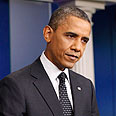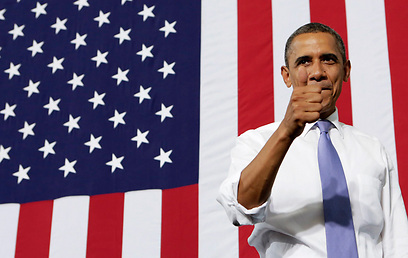
Ambiguous attitude towards Israel: Obama
צילום: AP
US' ambiguous attitude flusters Israel
Wall Street journal editorial wonders how Israel could trust US president on Iran issue when he keeps sending out mixed signals
A weekend editorial in the Wall Street Journal criticized the Obama administration over its ambiguous attitude to Israel. Claiming that on the one hand, it supports Israel while on the other actually seems more inflexible towards Israel than towards the Iranian nuclear program.
"Barack Obama is fond of insisting that he 'has Israel's back.' Maybe he should mention that to the Chairman of the Joint Chiefs," the paper wrote then went on to quote General Martin Dempsey's comments in last week's Guardian newspaper.
Related stories:
- Official: Obama will make Bibi pay after elections
- Romney: Obama threw Israel under the bus
- McCain: Obama lost Israel's trust
Dempsey warned that any Israeli attack on Iran would "clearly delay but probably not destroy Iran's nuclear programs." He added that economic sanctions on Iran were having an effect and needed more time to work, but that the good they were doing "could be undone if (Iran) was attacked prematurely."

Dempsey: Mixed signals? (Photo: AFP)
And to underscore the firmness of his opposition to an Israeli strike, the Chairman added that "I don't want to be complicit if they choose to do it."
"We don't know what exactly Gen. Dempsey thinks American non-complicity might entail in the event of a strike," the article's writers wondered.
"Should the Administration refuse to resupply Israel with jets and bombs, or condemn an Israeli strike at the UN? Nor do we know if the General was conducting freelance diplomacy or sending a signal from an Administration that feels the same way but doesn't want to say so during a political season.
"The remarks were counterproductive and oddly timed, with this week's report by the International Atomic Energy Agency that Iran's nuclear programs haven't been slowed in the least by US or international sanctions. In fact, they are accelerating."
Iran has nearly doubled the number of centrifuges at the Fordo facility near Qom and it is suspected that it is continuing to hide evidence of nuclear activity at a military complex near Parchin.
The editorial details Obama's "head-in-the-sand performance" explaining that it is "why many Israeli decision-makers believe they had better strike sooner than later.
"Not only is there waning confidence that Mr. Obama is prepared to take military action on his own, but there's also a fear that a re-elected President Obama will take a much harsher line on an Israeli attack than he would before the first Tuesday in November."

Losing confidence in Obama (Photo: Reuters)
This is why the paper claims it is no wonder "the Israelis are upset — at the US Administration. It's one thing to hear from Mahmoud Ahmadinejad that he wants to wipe you off the map: At least it has the ring of honesty. I
"It's quite another to hear from President Obama that he has your back, even as his Administration tries to sell to the public a make-believe world in which Iran's nuclear intentions are potentially peaceful, sanctions are working and diplomacy hasn't failed after three and half years."
The report notes: "If Gen. Dempsey or Administration officials really wanted to avert an Israeli strike, they would seek to reassure Jerusalem that the US is under no illusions about the mullahs' nuclear goals—or about their proximity to achieving them. They're doing the opposite.
In an editorial in the Washington Post Patrick Pexton (the Washington Post's Ombudsman) says that his readers periodically ask “Why does the press follow every jot and tittle of Iran’s nuclear program, but we never see any stories about Israel’s nuclear weapons capability?”
"It’s a fair question," says Pexton who writes that he reviewed the archives on Israel's nuclear capabilities and believes that the US is co-party to the nuclear opacity. He then goes on to quote George Perkovich, director of the nuclear policy program at the Carnegie Endowment for International Peace.
Perkovich said "there are benign and not-so-benign reasons that US officials are so tight-lipped. The United States and Israel are allies and friends. 'Do you ‘out’ your friends?' he asked.
Yet Pexton stressed: "I don’t think many people fault Israel for having nuclear weapons. If I were a child of the Holocaust, I, too, would want such a deterrent to annihilation.
"But that doesn’t mean the media shouldn’t write about how Israel’s doomsday weapons affect the Middle East equation. Just because a story is hard to do doesn’t mean The Post, and the US press more generally, shouldn’t do it."
- Receive Ynetnews updates directly to your desktop










